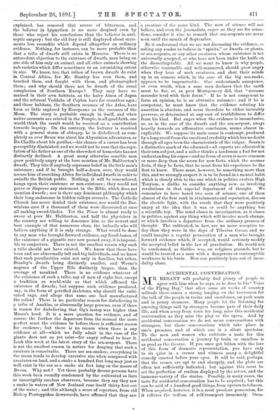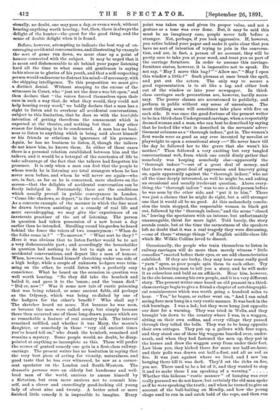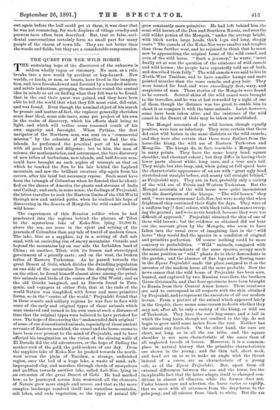ACCIDENTAL CONVERSATION.
MR. BESANT will probably find plenty of people to agree with him when he says, as he does in his " Voice of the Flying Day," that after some six weeks of country solitude there comes a strong longing on the townsman for the talk of the people in trains and omnibuses, on park seats and in penny steamers. Many people let the listening for amusing things said by strangers become part of their daily life, and when away from town for long, miss this accidental conversation as they miss the play or the opera. And by accidental conversation we do not mean conversations with strangers, but those conversations which take place in one's presence, and of which one is a silent spectator. To the men and women who cultivate a taste for this accidental conversation a journey by train or omnibus is as good as the theatre. If you once get bitten with the love of this form of dramatic representation, you have only to sit quiet in a corner and witness many a delightful comedy enacted before your eyes. It will be said, perhaps, that the scenes are apt to end abruptly, and the plots are often not sufficiently indicated; but against this must be set the perfection of realism displayed by the actors, and the • immense variety of the stories. Possibly, in many cases, the taste for accidental conversation has to be acquired ; but this can be said of a hundred good things, from oysters to tobacco. When acquired, however, it is a most precious possession, for it relieves the tedium of self-transport immensely. Owe,
sionally, no doubt, one may pass a day, or even a week, without hearing anything worth hearing; but, then, there is always the :delight of the hunter—the quest for the good thing, and the sense of double delight when it is found.
Before, however, attempting to indicate the best way of en- couraging accidental conversations, and illustrating by example the sort of game run down, we must clear up a point of honour connected with the subject. It may be urged that it is mean and dishonourable to sit behind your paper listening .hard all the time to what some old gentleman is saying • to his niece as to glories of his youth, and that a self-respecting person would endeavour to distract his mind—if necessary, with the shipping intelligence. To this proposition we must give -a. distinct denial. Without stooping to the excuse of the witnesses in Court, who "just set the door a wee bit open," and then declare that " the voices forced themselves upon their ears in such a way that, do what they would,. they could not help hearing every word," we boldly declare that a man has a -'right to listen and to overhear all accidental conversations, subject to this limitation, that he does so with the bona fide intention of getting therefrom the amusement which is -expected at the theatre, and nothing but that. Any other -reason for listening is to be condemned. A man has no busi- ness to listen to anything which is being said about himself -or his friends or relations in ignorance of his presence. _Again, he has no business to listen, if, though the talkers do not know him, he knows them. In either of these cases -there is a personal relation established between him and the -talkers, and it woald be a betrayal of the courtesies of life to -take advantage of the fact that the talkers had forgotten his presence. It is only when a man can feel that the people to whose words he is listening are total strangers whom he has never seen before, and whom he will never see again—who -are, in fact, as far as he is concerned, mere shadows on the .screen—that the delights of accidental conversation can be freely indulged in. Fortunately, these are the conditions -which usually prevail in public conveyances in London. ' Come like shadows, so depart," is the rule of the knife-board. As a concrete example of the manner in which the line must be drawn between assisting at a comedy of real life and mere eavesdropping, we may give the experiences of an inveterate practiser of the art of listening. The person in question had taken possession of a new house a day earlier than he intended. Strolling round his garden he heard behind the fence the voices of two country-men : " When do the folks come in ? " " To-morrow." "What sort be they ? " -Here it was obvious that to listen further would be to act a very dishonourable part ; and accordingly the householder in question had nothing to do but to sigh as a lover of -accidental conversations, and depart like a man of honour. When, however, he found himself sketching under one side of -a high hedge, while a couple of unknown hedgers were trim- ming on the other, he could listen with a perfectly easy conscience. What he heard on the occasion in question was well worth hearing. " So they did take the hemlock and -boiled it, and gave it to the 'oman ; and the 'oman died." "Did er, now-!" Was it some new tale of rustic poisoning --that was being related, or some ancient fable, old perhaps as the Odyssey, which was being re-dished by one of the hedgers for the other's benefit P Who shall say P The sketcher heard no more. Not because he was seen, or because the men were called away, but simply because there then occurred one of those long-drawn pauses which are so remarkable a feature of real country talk. The interval remained unfilled, and whether it was Mary, the mason's daughter, or somebody in those " very old ancient times _you've heard tell on," who drank the hemlock, remained and remains a mystery. Some people would, no doubt, be disap- pointed at anything so incomplete as this. These will prefer 'the scenes of genteel comedy one gets in a first-class railway- carriage. The present writer has no hesitation in saying that the very best piece of acting for vivacity, naturalness, and good taste that he has ever witnessed, he saw as a corner- seat spectator on the London and South-W,estern. The dramatis personm were an elderly but handsome and well- bred man of the world, anxious to amuse himself by a flirtation, but even more anxious not to • commit him- self, and a clever and exceedingly good-looking old young lady of about nine and twenty. A better acted or more finished little comedy it is impossible to imagine. Every
point was taken up and given its proper value, and not a gesture or a tone was over done. But, it may be said this must be an imaginary case, peopli never talk before a stranger. Not, perhaps, if you look aggressive. If, however, you retire behind your paper and make it quite clear that you have no sort of intention of trying to join in the conversa- tion, and are, in fact, a person of no account, they will be pretty sure to take you at your word, and treat you as part of the carriage furniture. In order to assume this carriage- furniture states, however, it is imperative not to speak. Do not say, " May I move this bag?" " Allow me," " May I open this window a little ?" Such phrases at once break the spell, and put out the actors. The only way to secure a good representation is to sit like a log. and either look out of the window or into your newspaper. In third- class carriages such precautions are, however, hardly neces- sary. The poorer classes are accustomed to publicity, and perform in public without any sense of uneasiness. The most thrilling scene will sometimes take place with five on each side. It was once the good-fortune of the present writer to be in a third-class Underground carriage, when a respectably dressed woman and a man, who can best be described by saying that he looked like what is described in the servants' adver- tisement columns as a " thorough indoor," got in. The woman's first words were as good as any ever invented by novelist or playwright to open a sensational story :—" He never knew till the day he followed her to the grave that she wasn't his mother." Then followed a very exciting but very tangled conversational web, from which one could dimly gather that somebody was keeping somebody else—apparently the " thorough indoor "—out of a great deal of money, and that there was a great deal of oppression and knavery going on, again apparently against the " thorough indoor," who sat all the time deeply interested, as well he might be, and asking an occasional and usually irrelevant question. Above every- thing, the " thorough indoor " was to see a third person before he was seen by the other side, and " put it to him." There was just a chance that he might do right, but a still stronger one that it would all be no good. At this melancholy conclu- sion the train stopped, the respectable woman in black got out, followed by the " thorough indoor," and the scene " closed in," leaving the spectators with an intense, but unfortunately unassuagable, thirst for more light. Told barely, the story sounds comic, but at the time the earnestness of the speakers left no doubt that it was a real tragedy they were discussing, —one of those "strange things" of English middle-class life which Mr. Wilkie Collins loved to dissect.
Occasionally, the people who train themselves to listen in railway-carriages will do more than merely witness " little comedies " enacted before their eyes, or see odd characteristics exhibited. If they are lucky, they may hear some really good "yarn" spun, as poor people spin them to each other. Try to get a labouring-man to tell you a story, and he will make it as colourless and bald as an affidavit. Hear him, however, in the ale-house, among his own people, and it is a very different story. The present writer once heard an old peasant in a third- class carriage begin to give a friend a chapter of autobiographi- cal reminiscences which, was worth going a hundred miles to hear. " Yes," he began, or rather went on, "And I can mind seeing four men hung in a very rustic manner. It was back in the rick burnings. I was a lad ; but they were hung just opposite our door for a warning. They was tried in Wells, and they brought 'em down to the country where I was, in a waggon, sitting on their own coffins, and every village they passed through they tolled the bells. They was to be hung opposite their own cottages. They put up a gallows with four ropes, and they stood one of these big waggons boarded over, under- neath, and when they had fastened the men up, they put in the horses and drew the waggon away from under their feet. Law bless you, they kicked there for more nor half-an-hour, and their polls was drawn out half-a-foot, and all as red as fire. It was just against where we lived, and I saw 'em hanging there till it was dark. They'd set the ricks on fire, you see. There used to be a lot of it, and they wanted to stop it and to make these I am speaking of a warning." Whether this hideous "rustic manner" of hanging was ever really pursued we do not know, but certainly the old man spoke as if he were speaking the truth ; and when he turned to give an account of the bull-baiting on Mendip, and how the young chaps used to run in and catch hold of the rope, and then run
out again before the bull could get at them, it was clear that he was not romancing, for such displays of village cruelty and prowess have often been described. But, true or false, acci- dental conversations certainly form no small part for many people of the charm of town life. They are not better than the woods and fields, but they are a considerable compensation.




































 Previous page
Previous page